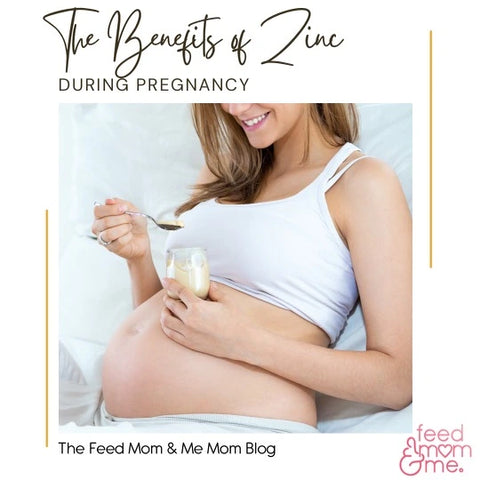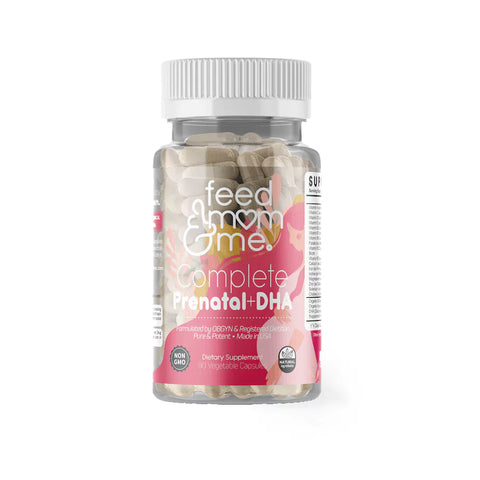Zinc Benefits During Pregnancy
Published:Updated:

Written by: Erin Lettieri; LIU Post Dietetic Intern
Medically Reviewed by: Dr. Nicole Palmer, DO
In This Article:
★ WHAT DOES ZINC DO FOR THE BODY?
★ CAN YOU TAKE ZINC WHILE PREGNANT?
★ HOW MUCH ZINC PER DAY FOR A WOMAN WHO'S PREGNANT?
★ WHAT FOODS CONTAIN ZINC?
★ CAN I TAKE ZINC WHILE PREGNANCT FOR A COLD?
★ BEST ZINC SUPPLEMENTS FOR PREGNANCY
Making sure to consume all the essential nutrients is very important, especially when you’re pregnant. Different nutrients help aid in a variety of bodily functions, as well as keeping the mother and the baby healthy.
Most nutrients can be consumed through various nutrient-dense foods, however, during pregnancy, you might be low on some key vitamins and minerals. Prenatal vitamins assist in making sure that the body is getting everything it needs during this time.
Zinc is one of the important nutrients needed throughout pregnancy as it has many benefits to both the mother and baby. It is also essential for normal immune function. [1] Zinc is found in both plant and animal food sources, but as mentioned previously, prenatal vitamins can help increase zinc consumption.[2]
We will be discussing how much zinc should you take, zinc side effects if ingesting too much, foods high in zinc, and other benefits of zinc in pregnancy.
★ WHAT DOES ZINC DO FOR THE BODY?
Zinc is a trace mineral that is important for the creation of our DNA, the growth of our cells, wound healing, helps support a healthy immune system and also supports rapid growth and development of tissues for the creation of the baby’s genetics.[3]
Trace minerals are essential to the human body and provide us with a ton of health benefits, such as brain development.[4] However, we only need them in a very small amount. Even though they are needed in small amounts, zinc deficiency can still occur.
Zinc deficiency can be caused by inadequate consumption of foods containing zinc or not taking the recommended supplements given to us by our healthcare provider. Your body can’t produce new healthy cells when you are deficient. [5]
Symptoms of zinc deficiency include unexplained weight loss, non-healing wounds, a decrease in your sense of taste and smell, diarrhea, and loss of appetite. [5]
Zinc deficiencies in pregnant women can cause an increased risk of malformation of the heart, lungs, brain, urogenital and skeletal system which can be due to impaired protein synthesis, cell division, and nucleic acid metabolism. Other studies have discovered a link between low birth weight and problems with pregnancy, labor, and delivery with zinc deficiency. [2]
On the other hand, high doses of zinc can also cause complications as well, such as nausea, vomiting, abdominal cramps, diarrhea, and headaches. It is also important to know that high zinc levels can cause copper deficiency and can be toxic to our bodies.[6]
Copper is another essential nutrient that we need in small amounts. It helps us keep a healthy immune system and produce red blood cells to support fetal development. It also helps form your baby’s heart, blood vessels, and nervous and skeletal system. [7]
For more on Important Minerals During Pregnancy check out our blog.
★ CAN YOU TAKE ZINC WHILE PREGNANT?
Zinc plays an important role in protein synthesis, cell division, and nucleic acid metabolism which are all necessary for development. [1] Not to mention, zinc plays a crucial role in maintaining our sense of smell and taste, while also supporting our immune system and healing chronic wounds.[9]
Most women get the necessary amount of zinc through food such as meat sources. However, prenatal vitamins contain zinc that will provide you with the amount you need for the day. Plant sources that contain zinc don’t absorb into our bodies as readily as zinc from meat sources. [2]
Mothers who are vegetarians or vegans need to speak to their healthcare provider about zinc supplementation. Zinc supplements contain a variety of zinc forms, one of them being zinc gluconate. Due to the lack of testing, there are warnings on zinc gluconate. It has not been categorized as safe for pregnant and breastfeeding mothers as it can increase the risk of fetal abnormalities. [10]
★ HOW MUCH ZINC PER DAY FOR A WOMAN WHO'S PREGNANT?
When women are pregnant or breastfeeding, it is recommended that they increase their zinc needs. According to the NIH, pregnant women should be getting 11 milligrams of zinc per day. Women that are breastfeeding should aim to have 12 milligrams of zinc per day. [2]
However, pregnant women that are 18 years of age and younger should be taking 12 milligrams of zinc per day. If breastfeeding women are 18 years of age or younger, 13 milligrams of zinc is recommended. [2]
When taking zinc supplements, it is always important to check with a health care provider first. Zinc supplementation benefits include reducing the risk of a zinc deficiency and reducing the risk of preterm births. However, there still needs to be more research to support this evidence.
★ WHAT FOODS CONTAIN ZINC?
There is an abundance of food that contains zinc such as red meat, poultry, nuts, and milk products. [8] It is important to note that during pregnancy, women should avoid any raw or undercooked meat, poultry, shellfish, fish, or eggs as there is a high risk for food-borne illness.
Other sources of zinc include whole grains, baked beans, chickpeas, nuts, and ready-to-eat breakfast cereals (honey bunches of oats contain 2.1 mg of Zinc!). Each food source contains different amounts of zinc. [7]
Foods high in zinc are:
- 3 ounces beef chuck roast, cooked: 7.0 mg of zinc
- 3 ounces Alaska King Crab, cooked: 6.5 mg of zinc
- 3 ounces beef patty, cooked: 5.3 mg of zinc
Other zinc food sources:
- 3 ounces pork chop, cooked: 2.9 mg of zinc
- ½ cup baked beans, canned, plain, or vegetarian: 2.9 mg of zinc
- 1 serving breakfast cereal, fortified: 2.8 mg of zinc
- 3 ounces dark meat chicken, cooked: 2.4 mg of zinc
- 1 ounce cashew, dry roasted: 1.6 mg of zinc
- 1 packet instant oatmeal, prepared with water: 1.1 mg of zinc
- 1 ounces almonds, dry roasted: 0.9 mg of zinc
- ½ ounces chicken breast, roasted: 0.9 mg of zinc
★ CAN I TAKE ZINC WHILE PREGNANCT FOR A COLD?
Several studies have found that zinc lozenges and syrups can reduce the duration of the common cold by one day, but not the severity of the cold. Taking too many zinc lozenges in a day can add up, which can create complications for both the mother and the fetus.
Oral zinc like lozenges and syrups, and some supplements, contain zinc gluconate. Note that it is necessary to speak with your healthcare provider first before taking over-the-counter cold medicines when pregnant or breastfeeding. [10]

★ BEST ZINC SUPPLEMENTS FOR PREGNANCY
One of the best over-the-counter zinc supplements can be found in a prenatal vitamin, like Feed Mom & Me Complete Prenatal with DHA. Each serving contains 15mg of zinc oxide.
This prenatal is formulated by an OBGYN & Registered Dietitian, containing all the nutrients needed during and after pregnancy. Each small and easy-to-swallow pill is packed with 22 key natural nutrients to provide nutritional support for you and your breastfeeding newborn. It contains calcium, iron, folate, vitamins A, E, C, D, and B complex, iron, choline, DHA, magnesium, iodine, and selenium.
The vegetarian formula is free of artificial colors or flavors, chemicals, preservatives, non-GMO, dairy, soy, or gluten-free. Each of their capsules contains B6, Organic Ginger, and Peppermint Powder, which can help alleviate morning sickness and nausea.
Adding to that, it is a women-owned company. Who better than a female would understand pregnancy!
- King JC, Cousins RJ. Zinc. In: Shils ME, Shike M, Ross AC, Caballero B, Cousins RJ, editors. Modern Nutrition in Health and Disease. 10. Philadelphia, PA: Lippincott Williams & Wilkins; 2006. pp. 271–285. [Google Scholar]
- U.S. Department of Health and Human Services. (2021, December 7). Office of dietary supplements - zinc. NIH Office of Dietary Supplements. Retrieved April 13, 2022, from https://ods.od.nih.gov/factsheets/Zinc-HealthProfessional/
- Chaffee, B. W., & King, J. C. (2012, July). Effect of zinc supplementation on pregnancy and infant outcomes: A systematic review. Pediatric and perinatal epidemiology. Retrieved April 13, 2022, from https://www.ncbi.nlm.nih.gov/pmc/articles/PMC3787719/
- Why Trace Minerals are Important for Health (brainbalancecenters.com)
- Watson, K. (2019, March 8). Zinc deficiency: Symptoms, diagnosis, and more. Healthline. Retrieved April 13, 2022, from https://www.healthline.com/health/zinc-deficiency
- Boggelwirth, B. (2020, December 9). Excessive zinc supplementation can be dangerous to your health. Mather Hospital. Retrieved April 13, 2022, from https://www.matherhospital.org/uncategorized/excessive-zinc-supplementation-can-be-dangerous-to-your-health/
- Davi, M. (2021, October 27). Important minerals during pregnancy. feedmomandme. Retrieved April 13, 2022, from https://feedmomandme.com/blogs/mama-blog/minerals-during-pregnancy
- Davi, M. (2021, January 4). Benefits Of Feed Mom & Me Prenatal Vitamins. feedmomandme. Retrieved April 13, 2022, from https://feedmomandme.com/blogs/mama-blog/benefits-of-prenatal-vitamins
- Zinc in diet: MedlinePlus Medical Encyclopedia
- Zinc gluconate Use During Pregnancy | Drugs.com
- Prenatal Multivitamin Complete With DHA & Methylfolate – feedmomandme
